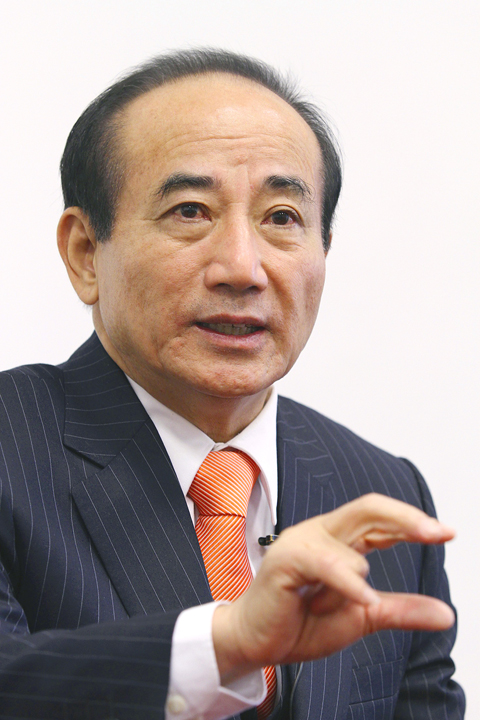A broad trade pact between Taiwan and China could be set back as legislators review and possibly overrule it, Legislative Speaker Wang Jin-pyng (王金平) said yesterday.
Taiwan’s polarized legislature could ask the government to change an economic cooperation framework agreement (ECFA) with China, which is expected to take the form of a free-trade-style deal that would lower tariffs in hundreds of sectors, Wang said.
The government has said it hopes to sign the agreement at a formal meeting with Beijing officials early this year. The deal is expected to open trade links between Taiwan and other Asian economies.

PHOTO: STEVE CHAN, REUTERS
“We can’t change the content of [an] ECFA, but we can overrule it or support it,” Wang said in an interview.
If the legislature overrules the pact, he said, legislators would ask the government to redo parts of the deal.
Some in Taiwan fear the pact would allow an unwelcome flood of Chinese goods into Taiwan’s economy. Their opposition could pressure legislators to take action.
“After it’s signed, does it affect the country’s sovereignty, and secondly is there anything that harms national security?” Wang said. “And will it create any impact on people’s rights and interests? We will evaluate it according to these criteria.”
The legislature hopes to spend more than a legal limit of one month to deliberate the deal after the two sides initially sign it, he said.
“If Taiwan doesn’t sign an ECFA with China this year, our competitiveness of course will be weakened, but that doesn’t go as far as saying we won’t survive,” Wang said.
Taiwan has floated to China a confidential list of 700 to 1,000 items for tariff revisions under an ECFA, subject to negotiations, analysts said.
Reports say Taiwanese officials have sought aggressive tariff cuts for textiles, machinery and petrochemical products.

Taiwan is stepping up plans to create self-sufficient supply chains for combat drones and increase foreign orders from the US to counter China’s numerical superiority, a defense official said on Saturday. Commenting on condition of anonymity, the official said the nation’s armed forces are in agreement with US Admiral Samuel Paparo’s assessment that Taiwan’s military must be prepared to turn the nation’s waters into a “hellscape” for the Chinese People’s Liberation Army (PLA). Paparo, the commander of the US Indo-Pacific Command, reiterated the concept during a Congressional hearing in Washington on Wednesday. He first coined the term in a security conference last

Prosecutors today declined to say who was questioned regarding alleged forgery on petitions to recall Democratic Progressive Party (DPP) legislators, after Chinese-language media earlier reported that members of the Chinese Nationalist Party (KMT) Youth League were brought in for questioning. The Ministry of Justice Investigation Bureau confirmed that two people had been questioned, but did not disclose any further information about the ongoing investigation. KMT Youth League members Lee Hsiao-liang (李孝亮) and Liu Szu-yin (劉思吟) — who are leading the effort to recall DPP caucus chief executive Rosalia Wu (吳思瑤) and Legislator Wu Pei-yi (吳沛憶) — both posted on Facebook saying: “I

The Ministry of Economic Affairs has fined Taobao NT$1.2 million (US$36,912) for advertisements that exceed its approved business scope, requiring the Chinese e-commerce platform to make corrections in the first half of this year or its license may be revoked. Lawmakers have called for stricter enforcement of Chinese e-commerce platforms and measures to prevent China from laundering its goods through Taiwan in response to US President Donald Trump’s heavy tariffs on China. The Legislative Yuan’s Finance Committee met today to discuss policies to prevent China from dumping goods in Taiwan, inviting government agencies to report. Democratic Progressive Party Legislator Kuo Kuo-wen (郭國文) said

The Ministry of Economic Affairs has fined Taobao NT$1.2 million (US$36,900) for advertisements that exceeded its approved business scope and ordered the Chinese e-commerce platform to make corrections in the first half of this year or its license would be revoked. Lawmakers have called for stricter supervision of Chinese e-commerce platforms and more stringent measures to prevent China from laundering its goods through Taiwan as US President Donald Trump’s administration cracks down on origin laundering. The legislature’s Finance Committee yesterday met to discuss policies to prevent China from dumping goods in Taiwan, inviting government agencies to report on the matter. Democratic Progressive Party